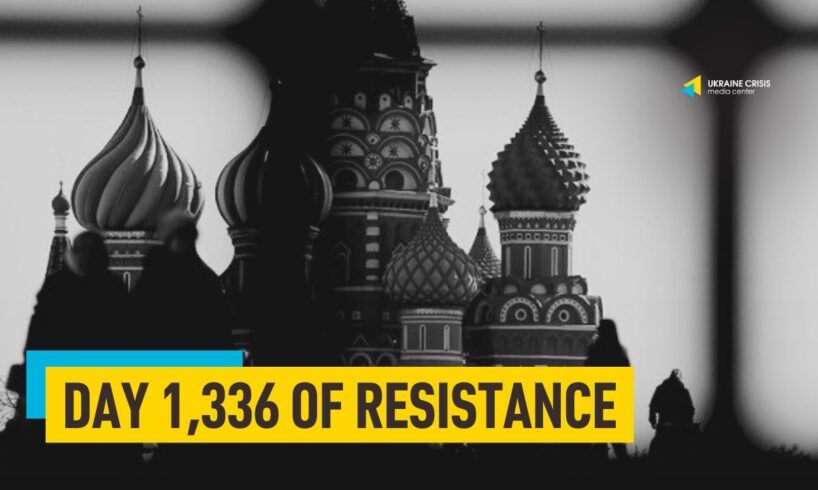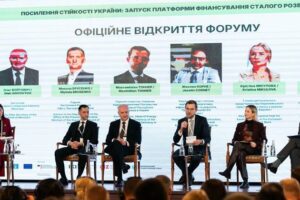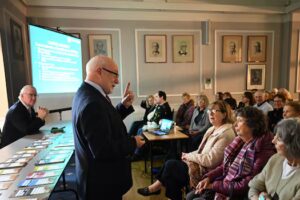
Russian attacks plunge Chernihiv in a total blackout. The fate of a Trump-Putin summit in Budapest is uncertain as a Rubio-Lavrov meeting is on hold. ISW has observed no indications that the Kremlin remains willing to accept anything less than Ukrainian capitulation to all of its original war demands.
Russian attacks plunge Chernihiv in total blackout
The northern city of Chernihiv is experiencing a complete blackout on Tuesday following Russian attacks on the region’s energy infrastructure the day before. The power and water supply was disrupted, the Chernihiv city council said in a statement Tuesday.
After around 9:30 p.m. local time on Monday, the northern part of the region lost all electricity supply.
Repairs continue and energy teams are working to restore power to consumers, prioritizing critical infrastructure sites and households first. Full restoration time is unknown at this time, the city council said on Tuesday morning.
Heating is being restored to healthcare facilities and kindergartens in Chernihiv, using alternative sources, it said.
The Chernihiv water utility also relies on alternative power sources to keep water and wastewater pump stations operational.
“All water facilities are at work, the wastewater system is fully operational. Water is supplied to the first stories, up to the fourth-fifth stories on average. In some neighborhoods, Sherstyanka in particular, [the water reaches] the sixth floor,” the utility said.
Fate of Trump-Putin summit in Budapest uncertain as Rubio-Lavrov meeting on hold
The anticipated meeting between [U.S. Secretary of State Marco] Rubio and his Russian counterpart Sergey Lavrov has been put on hold for the time being, a White House official told CNN. The paragraphs below are quoted from the article.
It was not immediately clear why the meeting was no longer taking place this week, though one of the sources said Rubio and Lavrov had divergent expectations about a possible end to Russia’s invasion of Ukraine.
It was also not immediately clear what impact the tabling of the pre-meeting between Lavrov and Rubio this week would ultimately have on the anticipated Trump-Putin summit in Budapest, Hungary.
Rubio and Lavrov on Monday had a phone call and discussed “next steps” to follow up on the call between their two presidents last week about a possible end to the conflict in Ukraine, according to a brief US State Department readout of the call.
The Kremlin, meanwhile, described the call as a “constructive discussion” that dealt with “possible concrete steps to implement the understandings” Trump and Putin reached on the call.
A source familiar with the matter told CNN, though, that officials felt after the Rubio-Lavrov call that the Russian position has not evolved enough beyond its maximalist stance.
For now, the source said, Rubio is not likely to recommend the Putin-Trump meeting move forward next week, but Rubio and Lavrov could speak again this week.
Rubio and Lavrov were meant to meet this week to organize the summit between U.S. President Donald Trump and Russian leader Vladimir Putin.
The U.S. side in the talks with Russia will be led by Secretary of State Marco Rubio instead of special envoy Steve Witkoff, The Wall Street Journal said last week.
No indications that Kremlin is willing to accept anything less than Ukraine’s capitulation, ISW says
ISW has observed no indications that the Kremlin remains willing to accept anything less than Ukrainian capitulation to all of its original war demands, and the Kremlin remains willing to expend considerable amounts of manpower, materiel, time, and other resources to achieving these demands on the battlefield if needed, the Institute for the Study of War said in a report on Monday.
Kremlin voices clarified Russia’s position on negotiations following Western reporting about the October 17 Trump-Zelensky meeting in order to reiterate that Russia remains committed to addressing the alleged “root causes” of the war and is unwilling to agree to a ceasefire.
The Kremlin has repeatedly referenced the need to eliminate the alleged “root causes” of the war in Ukraine, which Kremlin officials have defined as NATO’s eastward expansion and Ukraine’s alleged discrimination against Russian-speakers.
The Kremlin uses discussions about these root causes to forward Russia’s original war demands for Ukrainian neutrality, the removal of the legitimate government in Ukraine, the installation of a pro-Russian government, and changes to NATO’s Open Door Policy.
Russian officials and pro-Kremlin voices downplayed or dismissed the prospect of territorial concessions following Western reporting that Putin recently made a similar offer for territorial concessions to Trump. Putin’s refusal to prepare the Russian people, including the important ultranationalist constituency, to make any concessions in the war in Ukraine is another indicator that he does not intend to diverge from his long-held demands in any future peace talks.
U.S. President Donald Trump announced following a call with Vladimir Putin on October 16 that he and the Russian leader had agreed to meet in Hungary in the coming weeks to discuss the war in Ukraine. Two senior officials told The Washington Post in an article published on October 18 that Putin told US President Trump on October 16 that Ukraine must cede the remainder of unoccupied Donetsk Oblast to Russia “as a condition for ending the war” and that he “would be willing to surrender parts” of occupied Zaporizhia and Kherson oblasts in exchange, ISW said Monday.
Speaking to reporters on October 16, Trump said Vice President JD Vance, Secretary of State Marco Rubio and special envoy Steve Witkoff will be part of the team that will negotiate with Russia.
“The planned meeting between the American and Russian presidents is great news for the peace-loving people of the world. We are ready!” Hungarian Prime Minister Viktor Orbán said in a post to X on October 16.
Rubio and [Russian Foreign Minister Sergey] Lavrov were due to have an initial meeting this week to discuss the details of the Hungary summit.
Asked by NBC News if he would push to go to Budapest, Zelenskyy said he had told Trump: “I’m ready.”
The Ukrainian leader told NBC News’ “Meet the Press” moderator Kristen Welker in an exclusive interview taped Friday that Trump needed to apply even more pressure on Putin than he had applied to Hamas during his recent success in securing a ceasefire in Gaza.
Zelenskyy had hoped that part of that pressure would be the delivery of long-range U.S. Tomahawk missiles that could be used to strike deep into Russia.





